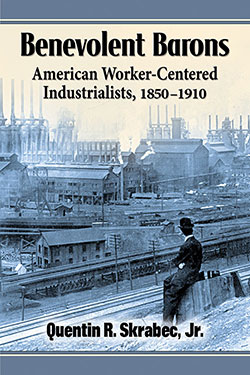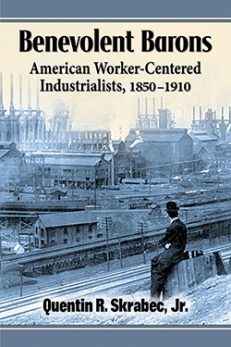Benevolent Barons
American Worker-Centered Industrialists, 1850–1910
$39.95
In stock
About the Book
American business has always had deep roots in community. For over a century, the country looked to philanthropic industrialists to finance hospitals, parks, libraries, civic programs, community welfare and disaster aid. Worker-centered capitalists saw the workplace as an extension of the community and poured millions into schools, job training and adult education. Often criticized as welfare capitalism, this system was unique in the world.
Lesser known capitalists like Peter Cooper and George Westinghouse led the movement in the mid– to late 1800s. Westinghouse, in particular, focused on good wages and benefits. Robber barons like George Pullman and Andrew Carnegie would later succeed in corrupting the higher benefits of worker-centered capitalism. This is the story of those accomplished Americans who sought to balance the accumulation of wealth with communal responsibility.
About the Author(s)
Bibliographic Details
Quentin R. Skrabec, Jr.
Format: softcover (6 x 9)
Pages: 240
Bibliographic Info: 19 photos, notes, bibliography, index
Copyright Date: 2015
pISBN: 978-0-7864-9494-1
eISBN: 978-1-4766-2029-9
Imprint: McFarland
Table of Contents
Table of Contents
Acknowledgments vii
Preface 1
Introduction 5
One. The Puritan Experiment 11
Two. Genesis of an Industrial Race 21
Three. European Industrialization, Master Entrepreneurs, and Worker Utopias 37
Four. Lowell and Rockdale 51
Five. Crisis in American Labor: Class, Skilled, and Unskilled Laborers 60
Six. Early Paternal and Employee-Driven Capitalists 70
Seven. Robber Barons and the Questioning of Capitalism 80
Eight. New Breed of Paternal Capitalists 89
Nine. American Patriarchal or Philanthropic Capitalism 101
Ten. The Failure of Pullman City 115
Eleven. The Greatest Paternalist of Them All 125
Twelve. Westinghouse’s Paternalism 131
Thirteen. Trusts and Corruption 143
Fourteen. Wilmerding, America’s New Lanark 155
Fifteen. Capitalism with a Heart—Westinghouse’s Vision 174
Sixteen. A Government Policy for Philanthropy and Paternalism 181
Seventeen. Corporate Paternalism 189
Eighteen. Unions, Industrial Democracy and the New Deal 200
Nineteen. Visions Come True 211
Twenty. And the Wolf Finally Came—Deindustrialization and Globalization 214
Chapter Notes 219
Bibliography 223
Index 227





